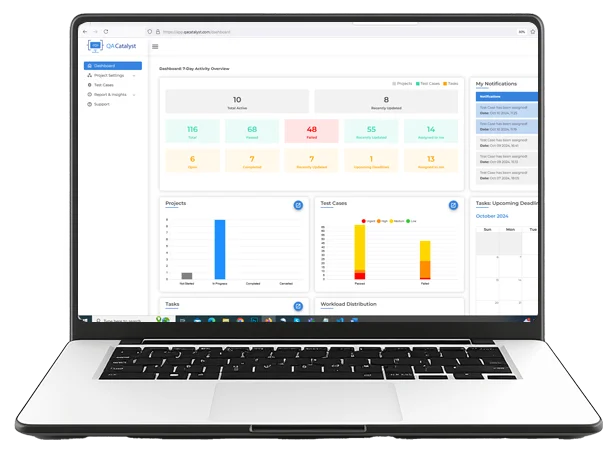In any QA process, efficient data management is key to ensuring seamless collaboration and reporting. For many teams, exporting test cases in a structured format is crucial for analysis, sharing, and record-keeping. QA Catalyst makes this process simple by allowing users to export test cases directly to Excel, ensuring that all stakeholders can easily access, analyze, and act on key testing data.
In this blog, we’ll explore how QA Catalyst’s Excel export feature helps streamline your QA management, improve data accessibility, and enhance team collaboration.
1. Why Exporting Test Cases Matters
Exporting test cases to Excel is more than just a convenience—it’s a powerful tool that improves efficiency across multiple aspects of the QA process. Whether you’re preparing for a stakeholder meeting, conducting detailed test case reviews, or sharing data across teams, having an organized export format allows for better analysis and decision-making.
Excel remains one of the most widely used tools in business, and QA Catalyst leverages this by enabling teams to quickly export their test case data in a format that everyone can understand and work with.
Key Features:
Easy sharing and collaboration across teams
Structured format for better analysis and reporting
Simplified preparation for stakeholder meetings
2. One-Click Export for Seamless Efficiency
QA Catalyst’s one-click export feature makes it incredibly simple to export test cases to Excel. With just a few clicks, users can download all relevant test case data—including assigned users, test statuses, results, and priorities—into an organized Excel sheet. This allows QA teams to work more efficiently without spending extra time formatting data manually.
Once exported, you can filter, sort, and manipulate the data in Excel to suit your specific reporting or analysis needs, making this feature a key productivity booster.
Key Features:
One-click export for instant Excel file generation
Export key test case data like statuses, users, and results
Save time by eliminating the need for manual formatting

3. Customization Options for Targeted Reporting
When exporting test cases, sometimes you only need data for specific projects, modules, or users. QA Catalyst allows you to apply custom filters before exporting, so you can generate targeted reports that focus on the most important data for your team. By filtering based on parameters like project, status, assigned user, or test case priority, you ensure that the data exported is relevant and actionable.
This targeted approach helps reduce information overload and ensures that each report serves its specific purpose, whether it’s for internal review or stakeholder presentations.
Key Features:
Apply custom filters before exporting
Generate targeted reports based on project, module, or user
Streamline reporting with only relevant data
4. Enhance Collaboration and Transparency
Exporting test cases in Excel is particularly useful for teams that need to share test data with external stakeholders or across departments. With an easily shareable format, team members across different functions can access and review the same data, fostering greater collaboration and transparency.
QA Catalyst’s Excel export feature enhances communication by ensuring everyone is on the same page. This can be especially beneficial during product demos, status meetings, or when sharing progress updates with clients.
Key Features:
Share test data easily across teams and departments
Enhance collaboration through transparency
Improve communication with stakeholders and clients

Conclusion :
The ability to export test cases to Excel is an essential feature that improves efficiency, collaboration, and data management in the QA process. With QA Catalyst, teams can quickly generate structured reports, share them easily across the organization, and gain deeper insights into their testing efforts—all with just a few clicks.
Whether you’re conducting a test case review, preparing for a client meeting, or analyzing testing trends, QA Catalyst’s Excel export functionality will help you streamline your workflow and improve overall productivity.
Ready to enhance your QA management with seamless test case exports? Get started with QA Catalyst today and experience a more efficient way to manage your test cases.
